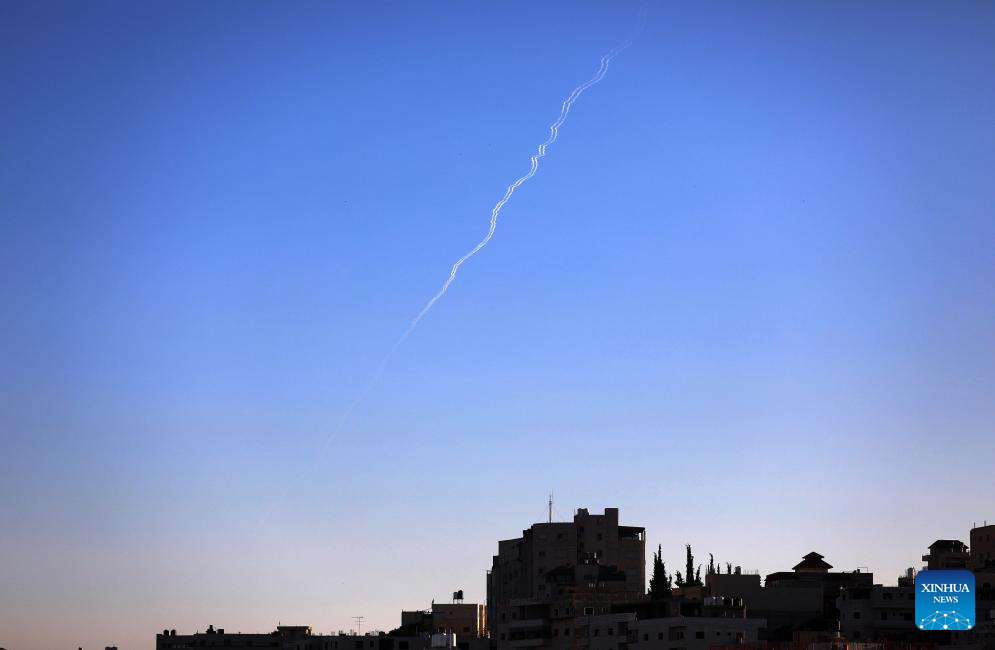 A missile trace is seen from the city of Hebron in the southern West Bank, on June 24, 2025. [Photo/Xinhua]
A missile trace is seen from the city of Hebron in the southern West Bank, on June 24, 2025. [Photo/Xinhua]
Israel said on Tuesday it had identified missiles from Iran, shortly after the Israeli authorities said it had accepted a ceasefire proposed by U.S. President Donald Trump.
According to local media reports, Israeli Defense Minister Israel Katz instructed Israeli military to "respond forcefully" after Iranian missile fire.
The latest escalation came shortly after Israeli Prime Minister Benjamin Netanyahu said Tuesday that Israel had accepted a ceasefire proposed by Trump and had achieved its war goals against Iran.
According to a statement by the office of Israeli prime minister, Netanyahu declared that Israel had achieved its goal of removing Iran's nuclear and ballistic missile threat.
Iran's Press TV said earlier Tuesday that ceasefire begins following waves of Iranian attacks on Israel.
Trump had earlier announced that a ceasefire between the two sides would begin around 0400 GMT, with Iran expected to halt its operations first.
Iranian Foreign Minister Abbas Araqchi said earlier that there was no "agreement" on a ceasefire between Iran and Israel. However, he suggested Iran would be prepared to halt further retaliation if Israeli attacks stopped by 4 a.m. Tehran time (0030 GMT).
"If Israel stops its illegal aggression against the Iranian people no later than 4 a.m., Iran has no intention of continuing its response afterwards," Araqchi wrote in a post on X, adding that "the final decision on the cessation of our military operations will be made later."
Hours earlier, a senior Iranian official told CNN that Tehran had not received any formal ceasefire proposal from the United States and saw no reason to halt hostilities.
"At this very moment, the enemy is committing aggression against Iran, and Iran is on the verge of intensifying its retaliatory strikes, with no ear to listen to the lies of its enemies," the official was quoted as saying. He added that remarks from U.S. and Israeli leaders would be seen as a "deception" intended to justify further attacks on Iran.
The conflicting narratives raised questions about the implementation and durability of any potential ceasefire. It remained unclear whether the reported deal had been communicated through diplomatic channels, or whether either side intended to follow the terms.
Trump announced Monday evening that Israel and Iran have reached a formal agreement to implement a complete and total ceasefire, marking what he called the end of the "12-Day War."
In a post on his Truth Social platform Monday, Trump said the ceasefire will initially last 12 hours, during which the opposing sides will maintain a posture of "peace and respect."
"On the assumption that everything works as it should, which it will," Trump wrote, "I would like to congratulate both countries ... on having the stamina, courage, and intelligence to end what should be called 'THE 12 DAY WAR.'"
Calling the agreement a breakthrough that "could have saved the Middle East from years of destruction," Trump ended his announcement with a sweeping message of unity: "God bless Israel, God bless Iran, God bless the Middle East, God bless the United States of America, and GOD BLESS THE WORLD!"


 Share:
Share: 




 京公網(wǎng)安備 11010802027341號(hào)
京公網(wǎng)安備 11010802027341號(hào)